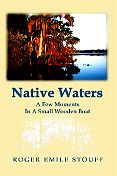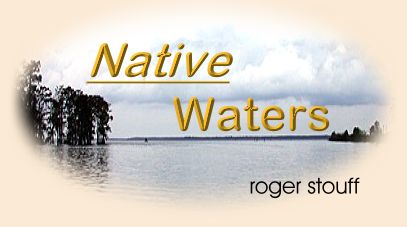|
(EDITOR'S NOTE: This is the last in a
series of columns on Stouff's recent trip
to Browning, Montana to fish for trout on
the Blackfeet Indian Reservation for an
upcoming episode of "Fly Fishing America"
to be aired next spring.)
The last day of actual fishing in Montana
was the day before I headed home to Louisiana.
The crew from Fly Fishing America had a few
last minute interviews to do, to get the
impressions of Joe and I on the whole event.
We would do these interviews on Cutbank Creek
just behind the Kipp Ranch.
The area of Cutbank Creek behind the ranch
was as fine a jewel as any I had seen in Montana.
A precious gem of a stream, it meandered in tight
coils here, and as Joe and the camera crew found
a comfortable spot to do interviews, I cast along
the creek searching for a few more trout. It's
the typical fisherman's malaise: Just one more
cast. Just one more cast...
In fact, I had not intended to fish so seriously
that I'd need waders so I didn't wear them. At
one point though I wanted to cross the creek.
I decided I'd "wet wade" as they call it in
Montana, cross without waders and just get
wet. Well, getting wet is fine and dandy, but
I was not prepared for the temperature of that
water. Waders keep you nice and warm, almost
too warm sometimes, but when I stepped into
knee-deep water at about 45 degrees, I understood
what cold water was. Completely. Boy, howdy.
I missed several half-hearted strikes and
so managed no trout that day. Soon they
were calling me over to do my interview,
which I dispatched with as much dignity
as I could. Then it was off to the ranch
again where I put my rods up for the last
time.
North American Indian Days was holding its
54th annual event in Browning during this
time, and we went on down to the fairgrounds
to get some footage there. We were just in
time for Grand Entry, too, the time when all
the dancers in all their regalia enter the
dance arena. It was a sight I hadn't seen in
a long, long time and missed greatly. When I
was a kid my parents and grandparents made the
pow-wow trail, as we called it. We'd set up a
booth and sell crafts my elders made, all over
the southeast. We also had a teepee my
grandfather made that we took with us and
erected for several years, though he always
had to explain that Chitimachas did not live
in teepees, we lived in palmetto huts.
"Then why do you have a teepee?" the folks
would ask him, perplexed.
Putting the back of his hand beside his mouth
clandestinely, he'd say, "It makes the tourists
happy," with a wink, and the folks - all tourists
themselves - would nod knowingly and wink back.
I hadn't seen a Grand Entry probably since
I was 12 years old, and I was glad to be
there in Montana to see it again.
We broke for supper and I headed for the
first booth I could find that had big black
letters reading "FRY BREAD."
If you don't know what fry bread is, you
have not lived. It's an unleavened bread
made by Native people, similar to Mexican
sopapias but something on the order of a
zillion times better. I have not had real
fry bread since I was in Arizona in 1980.
I have tried cooking it here, but there's
something about the altitude difference
that just doesn't work unless you know
how to compensate for it. Joe's wife Kathy
had made fry bread our second supper and
I about killed myself on it, but was ready
for more.
The booth-bought fry bread was nowhere near
as good as at the Kipp house, but it weren't
nothing to sneeze at, believe me. I also had
an Indian Taco, which is simply a taco on
fry bread, and let me tell you something,
cher, that was some good yeah! At the trading
post in Browning I saw a T-shirt that read "Will
Work for Fry Bread" and I almost bought it, but
opted instead for a T-shirt with a beautiful
embroidered fishing fly and the legend "Here,
fishy, fishy" on it. Hee-hee. Spinnerbaits, phooey!
Sunday was pretty much a resting day.
Mick would arrive and we'd leave about
three in the afternoon to make the long
trek back to Kalispell to catch the flight
to Seattle, then Houston and finally to
Lafayette, a redeye trip if I ever heard
of one. This time Mick would drive south
of Glacier National Park for a whole
different view of Montana.
With Indian Days going on, Joe had lots
of people coming in so we said our goodbyes
early. I understand how it is with all your
people arriving, and the pressure of tending
to our camera shoot to boot. We stopped long
enough at Indian Days to watch part of the rodeo,
but had to leave before the best parts.
Then I was on that same prop-job airplane
and leaving Kalispell behind, having shook
hands with Mick and vowed to do my best to
be as hospitable when they come to Louisiana
in the fall. I was exhausted, had a much
easier time of flying on the way home, really.
For instance, when I got on the plane in Seattle
to go to Houston, I swear I sat down, buckled
up and the pilot said, "We'll be setting down
at George Bush International in about 15 minutes."
Just that fast. I slept the whole time, didn't
even remember taking off.
A dozen hours of travelling later and weary
as a dog, I finally found myself in Lafayette,
looking for my truck in the parking lot,
turning from Surrey Street onto U.S. 90 and
pointing the front bumper happily toward the
Rez. Patches spun circles and crawled up one
side of me and down the other when I got in
the door. She had been in the care of friends
who had come over to feed her daily, and there
had been no bloodshed, remarkably. Her loud
meowing sounded like, "Hey where you been all
this time this guy he came every day and gave
me food and then he was gone and I think he
drank all the beer out of the fridge and then
there was this day when the lights went out
because it was storming outside and you know
how much I hate that and another day there was
this bird sitting on the porch and I thought
I could jump on it but I bruised my nose on
the window pane and where HAVE YOU BEEN?"
I was still exhausted and slept most of the day.
In my dreams were wild trout and clear, rushing
water. Chief Mountain loomed over them all, and
cattle fussed nervously about grizzlies in their
proximity.
So that's the tale of my time in Montana.
My thanks to Barrett Productions for allowing
me that once-in-a-lifetime opportunity. It was
truly a dream come true. Thanks also to Joe Kipp,
and if any of you kind folks should ever need
a guide to fish for trout on the Blackfeet
Reservation, look no further than Morning
Star Troutfitters. Anybody that could take
a southern Chitimacha-Cajun out of the
blackwater swamps and teach him to catch
all those trout including two gorgeous and
big lake trout in three days has got it
going on, ya folla?
I look forward to having him and the film
crew here in the fall, and hopefully we can
catch some bass, big redears or whatever.
Perhaps even some trout of the speckled
variety on Louisiana's famous coast. My
native waters, like his, are wide and varied.
I believe what struck me most about the trip,
besides the beautiful terrain, the awesome
trout, and wonderful people, were the words.
Remember that the Blackfeet people had serious
European contact only some 130 years ago,
whereas that same level of contact for
Chitimacha was some 350 years ago. His people
are not as far removed from pre-contact days
as mine.
There are voices in his mountain streams
as surely as in my lakes and bayous. I
could not hear them as clearly as he,
son of those lands and mountains, but
their whispers were there. Perhaps he
will hear the words here, too, the words
at the base of cypress trunks with soaked
waterlines, along shell reefs and at the
back end of dark canals. Even three and a
half centuries has not silenced them.
That's the power of native waters and
native earth. They whisper and sing.
They refuse forgetfulness. Wild trout
and wild bluegill, cutthroat or bass,
it's all the same. The heart of the land
and the waters is beating with power,
still vibrant, and the resonances strike
chords in the soul of those who will listen
and hear. ~ Roger
 It's out! And available now! You can be one of the
first to own a copy of Roger's book. Native Waters: A
Few Moments in a Small Wooden Boat
It's out! And available now! You can be one of the
first to own a copy of Roger's book. Native Waters: A
Few Moments in a Small Wooden Boat
Order it now from
www.iuniverse.com, Amazon.com,
or Barnes & Noble.com.
Roger will also be giving away three autographed copies to
readers. Stay tuned, for an announcement on the Bulletin
Board on that soon.
|


 It's out! And available now! You can be one of the
first to own a copy of Roger's book. Native Waters: A
Few Moments in a Small Wooden Boat
It's out! And available now! You can be one of the
first to own a copy of Roger's book. Native Waters: A
Few Moments in a Small Wooden Boat